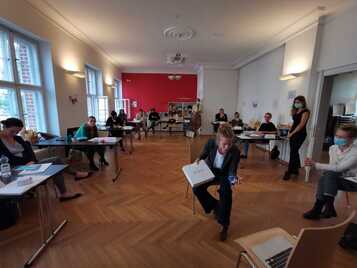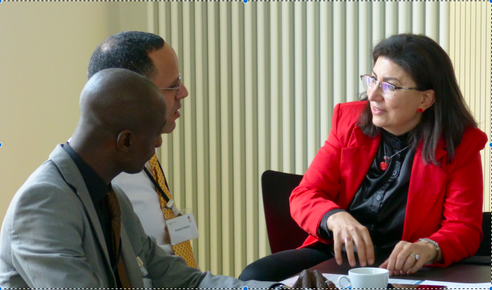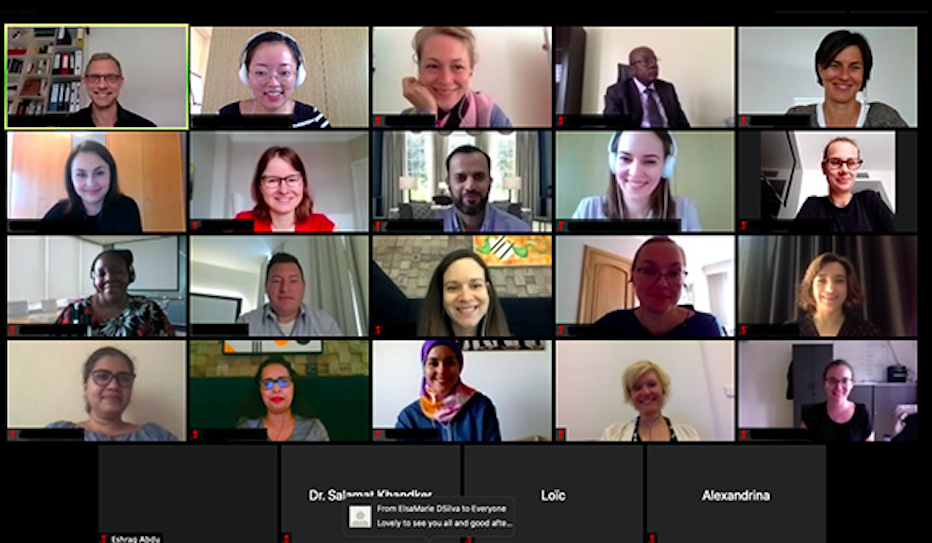Peace Mediation & Crisis Diplomacy in Action
|
On a yearly basis, the Training Academy for International Diplomats of the Federal Foreign Office designs and realizes its 5-days Network Consolidation Programme for International Diplomats in close cooperation with the Center for Peace Mediation and external experts from other institutions like the Swiss Federal Department of Foreign Affairs.
|
The programme offers practical insights into the methods, models and concepts of peace mediation, process design and dilemma management. On this basis, participants analyse crisis and conflict scenarios they are facing and develop hands-on skills and strategies to tackle them effectively.
|
Peace Mediation & Crisis Diplomacy in Action: The Programme
Over the last decade, in numerous countries and contexts, mediation and dialogue have become an ever more important response to political crises. Mediation and dialogue processes can be conducted by specialized methodical experts, diplomats with support teams and non-governmental actors, with a wide range of possible functions and roles involved. All those actors and support infrastructures are well-advised to proceed on a solid normative and methodological basis as well as to coordinate their engagements carefully with the interventions of other intermediaries in a conflict system. Based as they are on principles such as inclusivity, consensus and local ownership, dialogue and mediation – especially if put into the wider context of multitrack diplomacy – can be seen as key methods of translating the ideas of inclusive peace and constructive response to crisis into practice. As many other states as well as international and regional organizations, Germany explicitly regards mediation and dialogue as integral parts of its conflict prevention capacities and as effective instruments for re-establishing and consolidating peace. The German Peace Mediation Framework published in 2019 summarizes Germany’s approach to mediation and dialogue and will also serve as one reference frame for the programme.
The first part of the interactive seminar focuses on preconditions and pitfalls of successful mediation, offers practical mediation training and an interactive examination of conflict cases from all fields of international politics. A series of creative problem-solving formats build the second part of the workshop. Here, the participants explore new perspectives on the conflicts in their own regions in order to identify potential entry points for the future. The third part of the workshop takes place in a tailor-made 1-to-1 coaching format. It offers participants a safe and focused environment to reflect on how to apply insights and competences gained in the program in their own working context, and identify their own possible role in and contribution to future mediation initiatives in their region
Over the last decade, in numerous countries and contexts, mediation and dialogue have become an ever more important response to political crises. Mediation and dialogue processes can be conducted by specialized methodical experts, diplomats with support teams and non-governmental actors, with a wide range of possible functions and roles involved. All those actors and support infrastructures are well-advised to proceed on a solid normative and methodological basis as well as to coordinate their engagements carefully with the interventions of other intermediaries in a conflict system. Based as they are on principles such as inclusivity, consensus and local ownership, dialogue and mediation – especially if put into the wider context of multitrack diplomacy – can be seen as key methods of translating the ideas of inclusive peace and constructive response to crisis into practice. As many other states as well as international and regional organizations, Germany explicitly regards mediation and dialogue as integral parts of its conflict prevention capacities and as effective instruments for re-establishing and consolidating peace. The German Peace Mediation Framework published in 2019 summarizes Germany’s approach to mediation and dialogue and will also serve as one reference frame for the programme.
The first part of the interactive seminar focuses on preconditions and pitfalls of successful mediation, offers practical mediation training and an interactive examination of conflict cases from all fields of international politics. A series of creative problem-solving formats build the second part of the workshop. Here, the participants explore new perspectives on the conflicts in their own regions in order to identify potential entry points for the future. The third part of the workshop takes place in a tailor-made 1-to-1 coaching format. It offers participants a safe and focused environment to reflect on how to apply insights and competences gained in the program in their own working context, and identify their own possible role in and contribution to future mediation initiatives in their region
Peace Mediation & Crisis Diplomacy in Action 2022: Translating the New Realism into Practice - Approaches & Instruments for a Possible Future Co-Existence in the OSCE Region, September 5 – 10, 2022
In the light of the significant recent shifts in the international conflict as well as peace and security landscape, the 2022 Network Consolidation Programme will be dedicated to rethink the approaches of peace mediation and crisis diplomacy. In particular, the new challenges and the necessary realism in the aftermath of the Russian invasion into Ukraine need to be translated into an adequate future practice of dialogue and mediation.
Under which conditions and with what objectives do negotiations make sense during ongoing war? How to negotiate with conflict actors willing to break key norms and promises, spread propaganda, and commit war crimes? How can meaningful, interest-based dialogue be installed even when there is deep distrust and denial between parties and no consensus about ground rules? And, in view of the current conflict situation, what kind of agreements are realistically possible, which forum, format and actor would be acceptable to truly serve the purpose of mediation?
The 24th Network Consolidation Programme provided a space to discuss those and other questions by focusing on the current conflict between Russia and Ukraine and Western powers and resulting developments and dynamics in the OSCE region. The programme brought together people from the chosen conflict context, people who work in or on that conflict context, and people who bring valuable perspectives from the outside.
The 2023 programme buildt on a solid previous training or extensive experience in dialogue and peace mediation. The spectrum of approaches ranged from mapping actor constellations, driving factors and dynamics of polarization to managing dilemmas and discussing explosive issues like conflicting identities as well as dealing with contested narratives and truths. Moreover, it explored the concepts of agonism and coexistence as an alternative to consensus-based concepts of peace in antagonistic conflict.
In the light of the significant recent shifts in the international conflict as well as peace and security landscape, the 2022 Network Consolidation Programme will be dedicated to rethink the approaches of peace mediation and crisis diplomacy. In particular, the new challenges and the necessary realism in the aftermath of the Russian invasion into Ukraine need to be translated into an adequate future practice of dialogue and mediation.
Under which conditions and with what objectives do negotiations make sense during ongoing war? How to negotiate with conflict actors willing to break key norms and promises, spread propaganda, and commit war crimes? How can meaningful, interest-based dialogue be installed even when there is deep distrust and denial between parties and no consensus about ground rules? And, in view of the current conflict situation, what kind of agreements are realistically possible, which forum, format and actor would be acceptable to truly serve the purpose of mediation?
The 24th Network Consolidation Programme provided a space to discuss those and other questions by focusing on the current conflict between Russia and Ukraine and Western powers and resulting developments and dynamics in the OSCE region. The programme brought together people from the chosen conflict context, people who work in or on that conflict context, and people who bring valuable perspectives from the outside.
The 2023 programme buildt on a solid previous training or extensive experience in dialogue and peace mediation. The spectrum of approaches ranged from mapping actor constellations, driving factors and dynamics of polarization to managing dilemmas and discussing explosive issues like conflicting identities as well as dealing with contested narratives and truths. Moreover, it explored the concepts of agonism and coexistence as an alternative to consensus-based concepts of peace in antagonistic conflict.
|
Peace Mediation & Crisis Diplomacy in Action 2021: Mediation and Dialogue in Polarized and Divided Societies, September 13 - 17, 2021
The 2021 Network Consolidation Programme on peace mediation was dedicated to a tendency that can be observed in an ever-increasing number of countries and contemporary conflict contexts: a new degree of societal polarization and division as well as distrust in political systems and procedures, blocking open-minded dialogue as well as complete peace processes. In many societies and regions, in conflicts triggered by such diverse processes as emancipation or secessionist movements, nationalist tendencies and responses to the corona restrictions a common shift towards polarization has become evident, in some cases resulting in political escalation. The Peace Mediation & Crisis Diplomacy in Action Programme 2021 directly responded to the need for specific formats and techniques for dealing with these polarization dynamics. During the week, both externally initiated mediation efforts and domestically induced dialogue processes, existing and possible future ones, were in the focus of attention. Accordingly, the programme invited diplomatic and civil society alike to jointly explore how to use mediation and dialogue methodologies for dealing constructively with societal divisions. |
The spectrum of potential approaches to tackle the year’s theme ranged from mapping actors, driving factors and dynamics of polarization in different context to managing dilemmas of inclusive processes, discussing explosive issues like conflicting identities and fragile societal consensus, and dealing with contested narratives and truths. Against that background, the programme created spaces and methods for an unfiltered, possibly challenging, but safe and constructive dialogue about the subjective perspectives, interests and experiences that fuel societal division lines.
|
Peace Mediation & Crisis Diplomacy in Action 2020: Mediation Responses to Conflicts in Times of Corona
|
The 2020 Peace Mediation & Crisis Diplomacy in Action Programme was dedicated to bringing together peace mediation and COVID-19. After an initial impulse to cancel this year’s week in the light of travel restrictions and new priorities, the Center decided to put the health crisis and resulting political and societal tensions and dilemmas in the center of the workshop.
|
From August 31 to September 4, 2020, 22 diplomats, civil society and security actors from 18 countries jointly explored how to use mediation and other problem solving methodologies for dealing constructively with crisis-driven tensions in their respective professional roles and working contexts.
|

The spectrum of scenarios addressed by the participants ranged from the intractable challenges of managing a health crisis in a stuck violent conflict (such as in Yemen) and societal polarization triggered by Corona-policies (such as in Germany) to new cooperation dilemmas (such as in developing a COVID-19 vaccine) and opportunities to use the health crisis as a stimulus for change (such as in Pakistan`s tree planting programme or with regard to migrant workers in the EU).
Tailored to the COVID-19 restricted travel conditions of participants, the programme was held a mixture of presence and online formats. It was realized in close cooperation between the German Federal Foreign Ministry, the Center for Peace Mediation at the European University Viadrina and external experts from the Swiss Federal Department of Foreign Affairs.
Tailored to the COVID-19 restricted travel conditions of participants, the programme was held a mixture of presence and online formats. It was realized in close cooperation between the German Federal Foreign Ministry, the Center for Peace Mediation at the European University Viadrina and external experts from the Swiss Federal Department of Foreign Affairs.
Viadrina Logbuch 2020: 22 Teilnehmende, 18 Länder, eine Pandemie - fünftägiger Workshop des Center for Peace Mediation macht Covid-19 zum Thema
Märkische Oder Zeitung 2020: Europa-Uni in Frankfurt (Oder) als globaler Krisenberater
Märkische Oder Zeitung 2020: Europa-Uni in Frankfurt (Oder) als globaler Krisenberater



